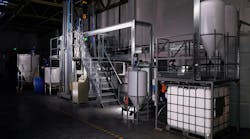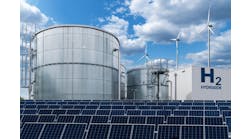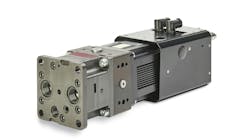Source: Integrals
Integrals starts U.K.’s first zero-emission pilot plant for LFP batteries
Aug. 13, 2024
Following successful laboratory trials, Integrals Power reported July 22 that it’s started producing proprietary, cathode-active lithium iron phosphate (LFP) and lithium manganese iron phosphate (LMFP) at its new pilot plant in Milton Keynes, U.K.
Developed in-house, Integrals’ modular production facility for LFP and LMFP can be readily scaled to higher volumes to meet demand, and produce a range of chemistries. The 48-hour process includes seven stages from raw materials to customer-ready samples. The new facility has an annual capacity of 20 metric tons—equivalent to batteries for 250 electric cars—which will be used mostly for evaluation by cell suppliers, battery and vehicle manufacturers worldwide.
“Starting production at our pilot plant is a milestone because it enables us to produce our high-performance LFP and LMFP cathode-active materials at volume,” says Behnam Hormozi, founder and CEO at Integrals. “We believe this is one of the first facilities of its kind in the U.K., and is exactly the resource its battery industry needs to support sustainable future electromobility growth. The pilot plant’s flexibility and scalability lets us manufacture different grades of LFP to suit different applications, including long-range EVs to off-grid energy storage, and increase capacity to meet demand from customers in the U.K. and worldwide.”
Integrals sources its raw materials from European and North American suppliers, which it reports ensures a purer, higher performance LFP and LMFP cathode materials with greater energy density compared to Chinese-manufactured cathode materials that presently account for about 90% of global production.
Consequently, Integrals’ LFP and LMFP nanomaterials reportedly have 30% more energy storage capacity, higher performance at extreme temperatures, and greater retained capacity over time. They’re ideally suited for manufacturers of battery cells for static energy storage, electric vehicles (EV), motorsports, aerospace and defense applications. Integrals reports its LFP has been assessed as ultra-high purity by a third-party using X-ray diffusion technology to study chemical composition and molecule lattice structure, which are key to material performance in battery cells.
The scalable pilot plant is also expected to boost the U.K.’s domestic battery industry by reducing its carbon footprint, enhancing supply chain security and transparency, and mitigating geopolitical issues such as import tariffs on EV and their components.





